ESG Topics A-Z
Agriculture

To PepsiCo:
Agriculture is core to PepsiCo's business. We source more than 35 agricultural crops and ingredients — such as potatoes, corn and oats — from more than 60 countries to make the convenient foods and drinks our consumers enjoy. Creating a more resilient, sustainable agricultural system helps to protect our continued business growth from disruption due to climate change, water scarcity and other environmental and social risks. It also can enhance the lives of agricultural workers and their communities. Our business values thriving communities and ecosystems in order for us to have the quality crops on which our business relies.
To the World:
Agriculture is central to both global challenges and solutions related to nutrition, the environment and economic well-being. PepsiCo believes that Positive Agriculture — our ambition to support regenerative farming practices, sustainable sourcing and improved livelihoods — will be pivotal in meeting the increasing demand for food as the global population grows, while also addressing the need to protect and enhance our natural resources and promote human well-being.
Approach
Across the globe, farmers are experiencing the impacts of Climate change and may bear the brunt of many climate-related risks. These risks — from biodiversity loss and freshwater scarcity to soil degradation and human rights — pose threats to the ecosystem, to our business and to the livelihoods of individuals and families across the agricultural supply chain.
Our Positive Agriculture agenda aims to address these risks, identify opportunities for systemic change and drive action and collaboration with key partners. We endeavor to listen to farmers to understand what drives their success and provide support to address their most critical needs.
We aim to embed Positive Agriculture by promoting the adoption of regenerative agricultural practices, increasing our water-use efficiency in crop irrigation, sustainably sourcing our key ingredients from our suppliers and supporting improved livelihoods through dedicated programming aiming to support economic prosperity, farm and farm worker security and women’s economic empowerment.
Positive Agriculture goals
We set standards for ourselves and our supply chain that reflect our ambition for a sustainable agricultural supply chain over the long term. In 2021, we announced new ambitions, setting 2030 goals to source crops and key ingredients in a way that aims to accelerate regenerative agriculture and strengthen farming communities. This 2030 agenda is part of our broader pep+ (PepsiCo Positive) ambition and includes a specific focus on:
- Spreading the adoption of regenerative agriculture practices across 7 million acres of the land used around the world to grow our crops and ingredients for our products.1
- Sustainably sourcing2 100% of key ingredients, expanding to include not only our grower-sourced crops (potatoes, whole corn and oats), but also key crops from third parties, such as vegetable oils and grains. Key ingredients are considered the building blocks of our convenient foods and drinks and are used in a significant portion of our products.
- Advocating for and contributing to a measurable improvement in the health of high water-risk watersheds where we directly source our crops. We exceeded our agricultural water-use efficiency target of 15% (reaching 22% when compared to a 2015 baseline) in high water-risk watersheds two years ahead of schedule.3
- Improving the livelihoods of more than 250,000 people in our agricultural supply chain and communities, through dedicated programming aiming to support economic prosperity, farm and farm worker security and women’s economic empowerment. We plan to focus our work on vulnerable farming communities linked to our supply chain, including smallholder farmers and farm workers, women and minority farmers. This goal counts people who are a part of in-depth, measurable interactions with dedicated PepsiCo programs and projects to support these communities.
We regularly review our sustainability goals and initiatives and consider changes that are from time to time warranted, including in the context of new developments, such as business growth, necessary investments relating to our initiatives and steps necessary to maintain Science Based Target alignment (which advises that targets are reviewed and, if necessary, recalculated and revalidated every five years at a minimum), as well as external developments.
pep+ in context: Agriculture
Achieving our Positive Agriculture ambitions will require unlocks across key internal and external factors.
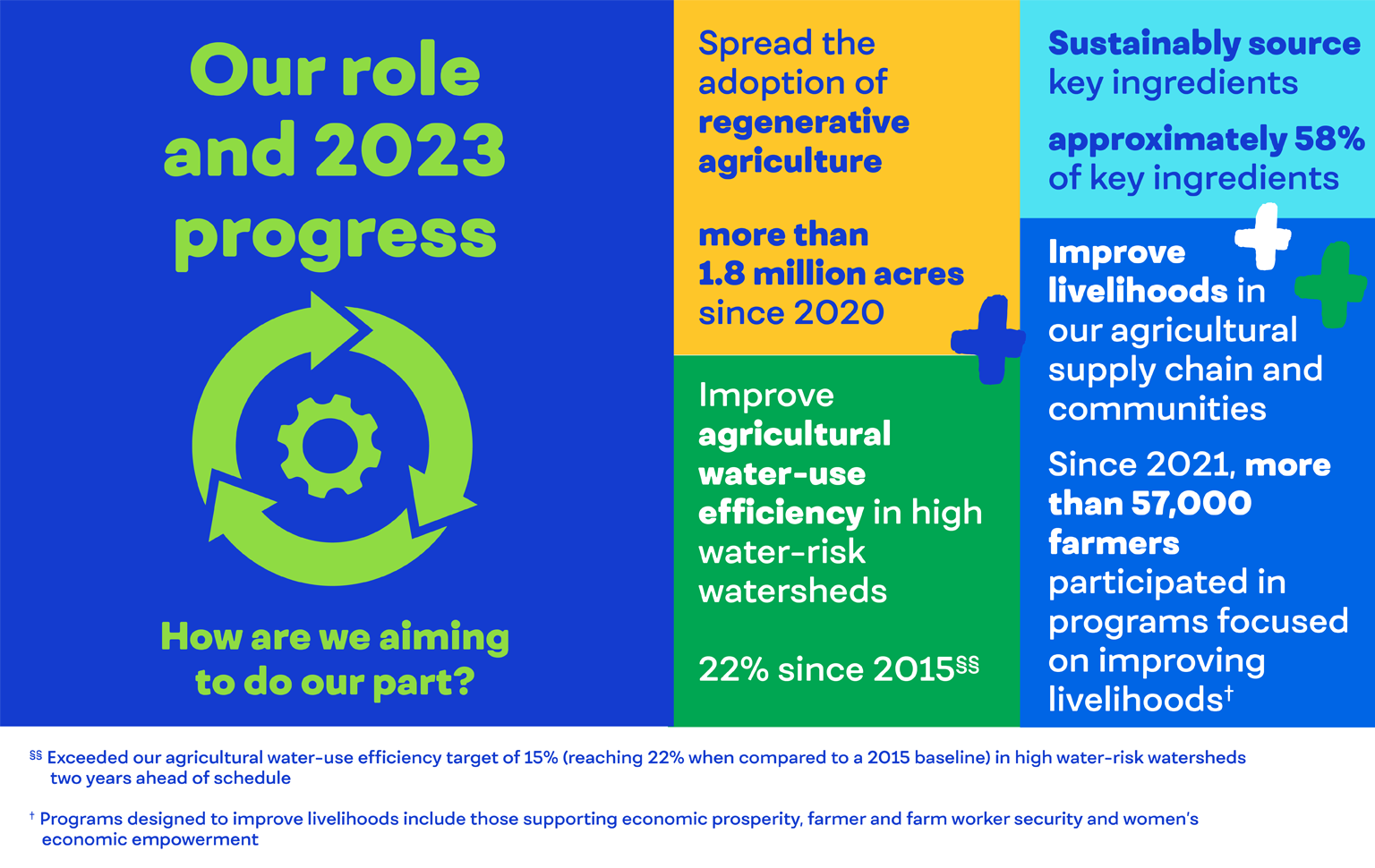
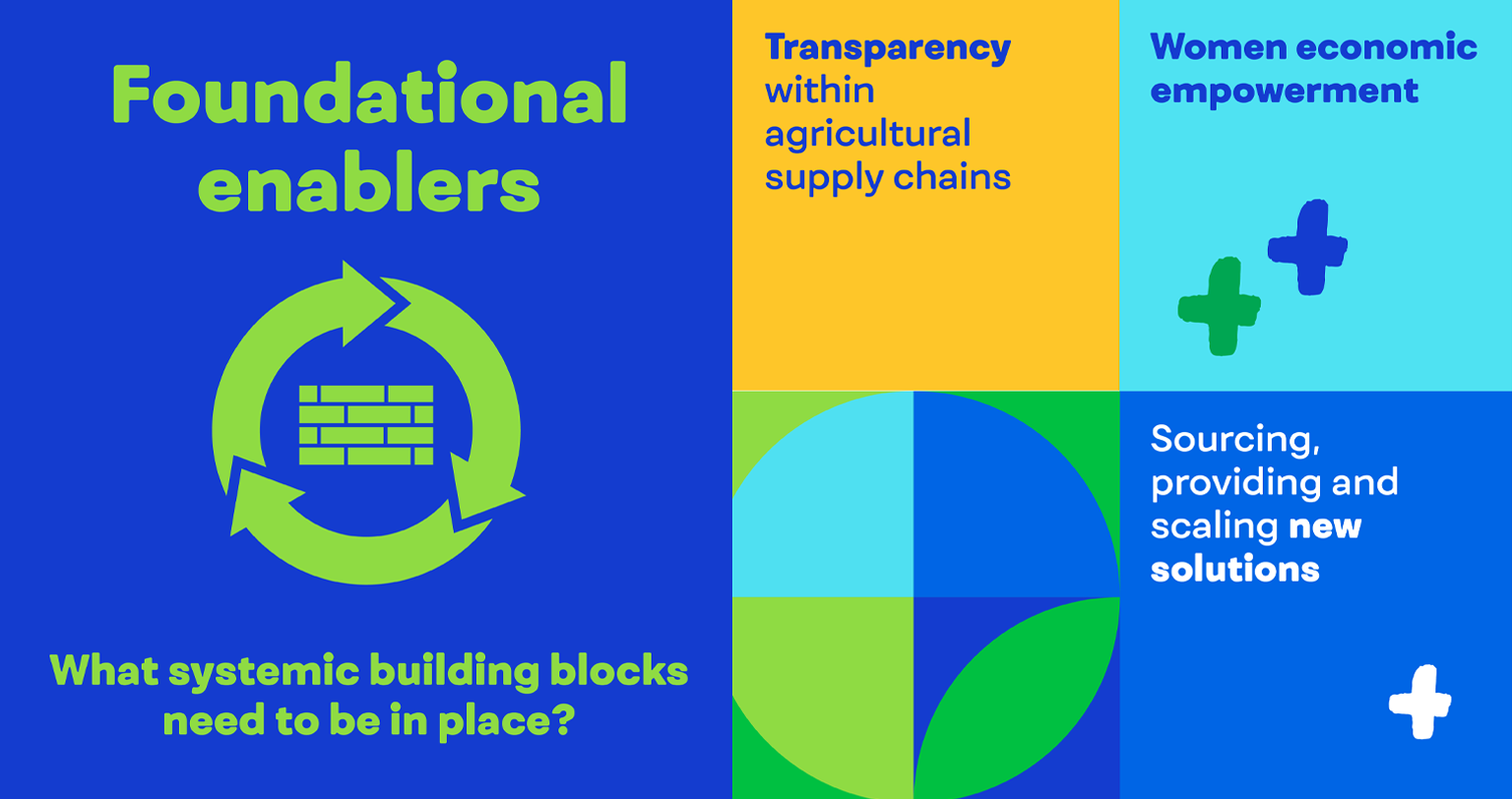
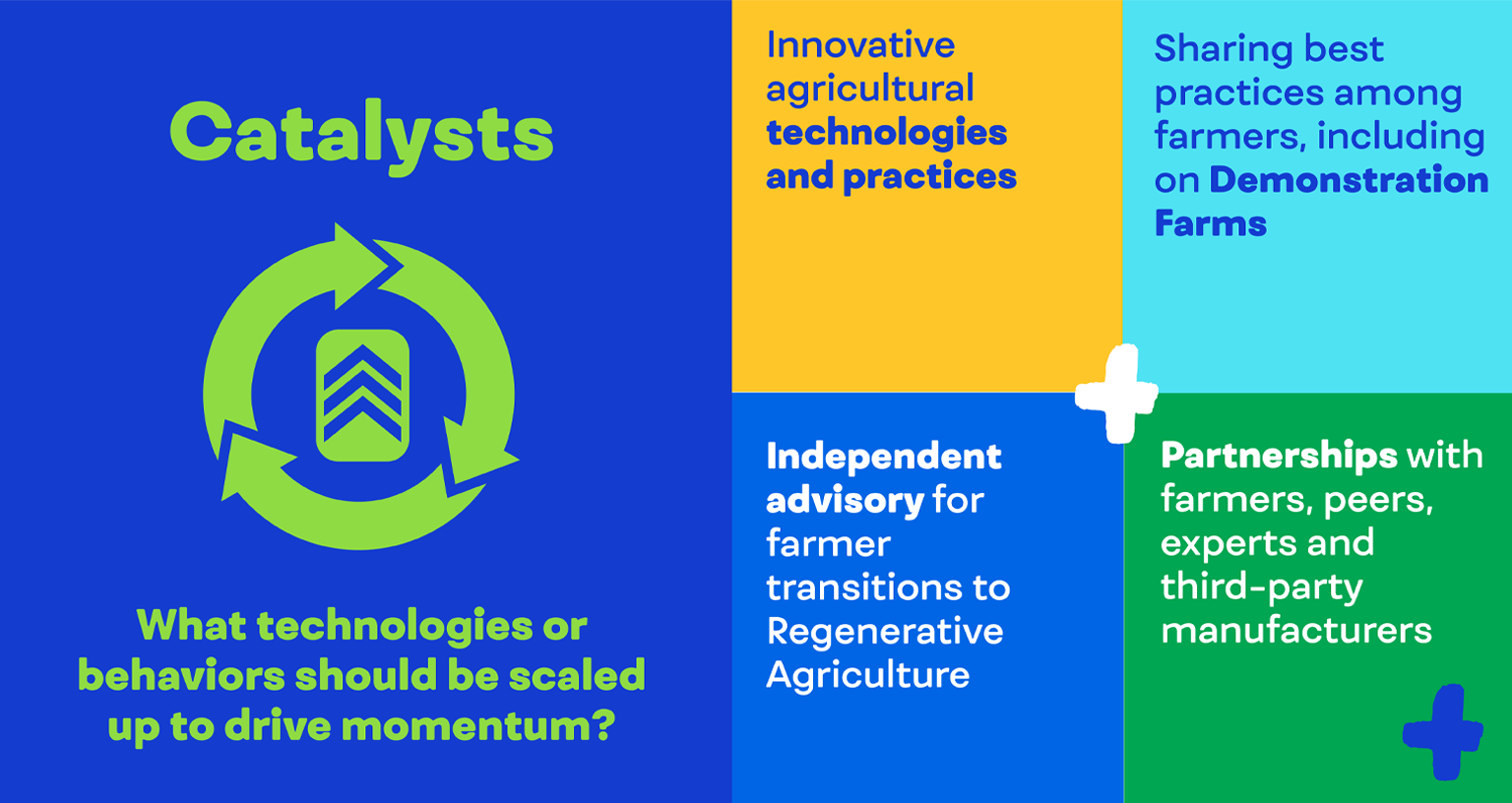
Regenerative agriculture
A key aspect of Positive Agriculture is extending regenerative farming practices — a set of techniques that aims to improve and restore ecosystems with a focus on:
- Building soil health and fertility;
- Reducing emissions and sequestering carbon;
- Improving watershed health;
- Protecting and enhancing biodiversity; and
- Improving farmer livelihoods.
We recognize that real change requires long-term, consistent effort and have launched landscape initiatives to tackle some of our key ingredients.
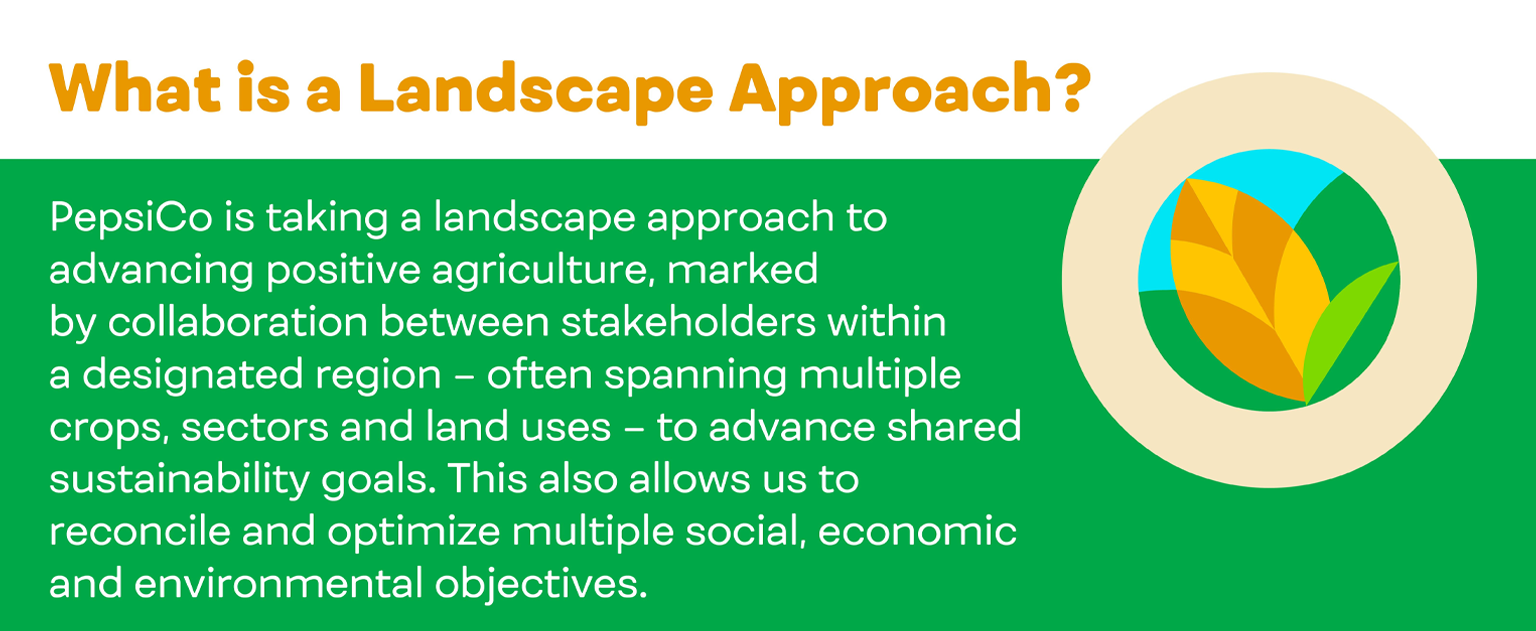
Today, a few of our landscape approaches are in the midwest U.S., Mexico and Southeast Asia, and we are expanding into new priority landscapes as we progress on our Positive Agriculture journey. We support the advancement of farming practices to optimize crop yields, respect human rights, improve farmer livelihoods and secure supply of agricultural ingredients. We do this because, simply put, without embracing regenerative agriculture, our ability to source the necessary ingredients for our products is in jeopardy, as is the world’s ability to reliably access safe and healthy foods. We believe that regenerative agricultural practices will be pivotal in meeting the world’s increasing nutritional demand, while also addressing the key risks that can be associated with agriculture, such as freshwater scarcity, deforestation, biodiversity loss, soil degradation and human rights.
We plan to continue investments to support regenerative agriculture adoption including through a planned $216 million multi-year investment in long-term, strategic partnership agreements with three of the most well-respected farmer-facing organizations — Practical Farmers of Iowa (PFI), Soil and Water Outcomes Fund (SWOF) and the Illinois Corn Growers Association (ICGA) — to drive adoption of regenerative agriculture practices across the United States.
We need our suppliers working with us to achieve our Positive Agriculture ambitions. In 2022, we launched a Positive Agriculture Playbook to help guide agricultural suppliers through the suggested steps of implementing and measuring the impact of regenerative farming in their value chain and to provide resources to help them along the way.
Sustainable sourcing
We depend on a sustainable supply of agricultural raw materials to meet the demands of our business. We aim to instill integrity, fairness and stewardship throughout our agricultural supply chain and hold our suppliers accountable to the same standards. Our agricultural suppliers are expected to adhere to our Supplier Code of Conduct and other relevant sustainable sourcing policies such as our Global Sustainable Agriculture Policy, Stewardship of Forests and Natural Ecosystems Policy, Land Policy and Global Human Rights Policy, as a condition of doing business with us.
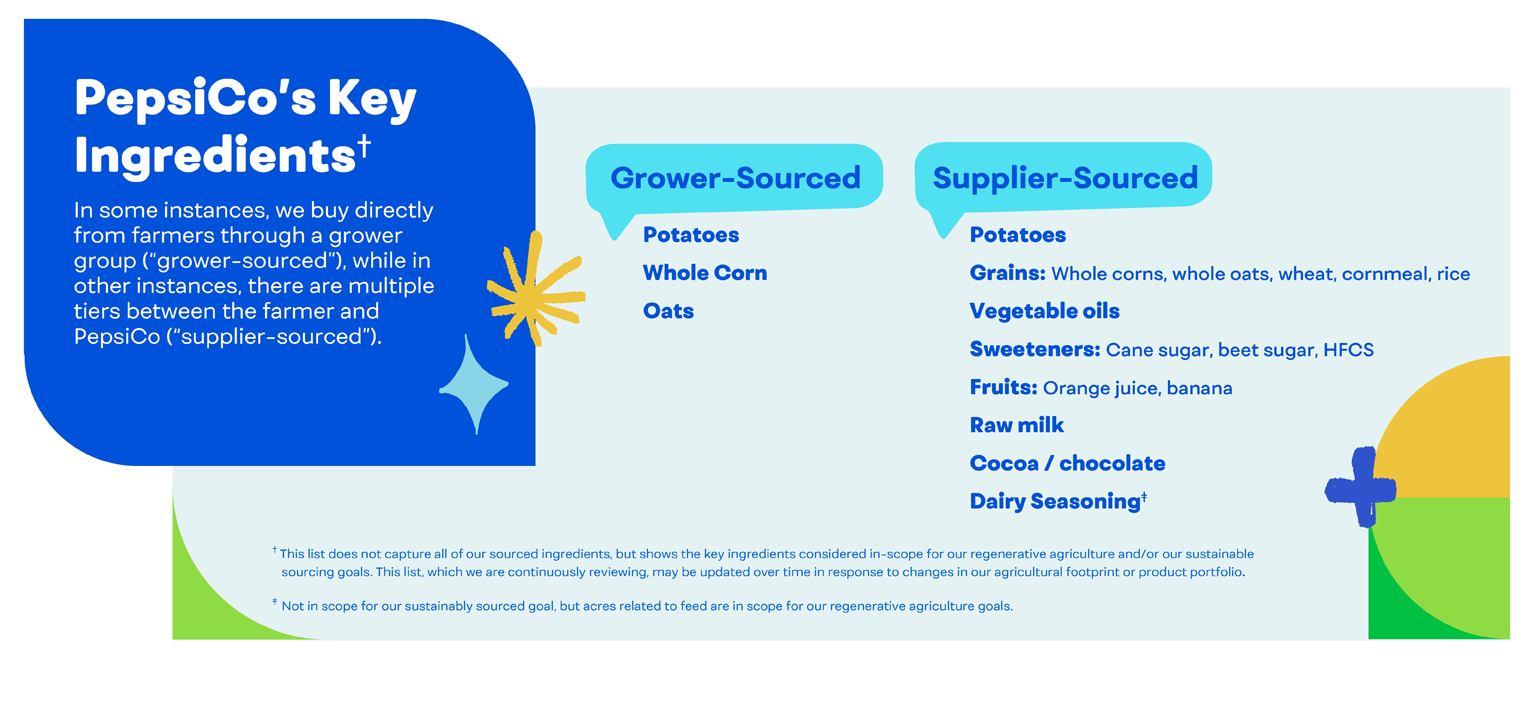
As of the end of 2023, 48% of the volume of our key ingredients were bought directly from farmers through a grower group (“grower-sourced”), while there were multiple tiers between the farmer and PepsiCo ("supplier-sourced") for the other 52%. We sourced 51% of our grower-sourced key ingredients from areas of high water-risk.4
Sourcing directly from growers
Furthering nearly a decade of progress with the Sustainable Farming Program (SFP), we continue to collaborate with farmers to adopt practices that build resilience and improve and restore ecosystems. Through our SFP, we champion and advance positive social, environmental and economic outcomes among the farmers from which we directly source crops. The SFP is designed to help boost agricultural productivity and extend availability of sustainably sourced crops today, while contributing to long-term transformation across the agricultural system. The program is based on self-assessment, capacity-building and verification. We work with farmers around the world to provide training for on-field agronomy, resource-efficient use of fertilizers and irrigation, plant protection techniques, workers’ rights, pest management and other issues. Once a farmer group meets the independently verified social, environmental and economic principles of our SFP, they are classified as sustainable for three years from the date of the verification assessment results. For more detail on the SFP, including a comprehensive list of the specific principles we work with farmers to implement, see the SFP Scheme Rules and the SFP Fundamental Principles.
To leverage the expertise and local influence of farmers, we have an extensive network of demonstration farms where locally-relevant best practices can be put into action and where local farmers can observe and learn from their peers.
Sourcing indirectly from suppliers
We purchase many ingredients that have been milled, crushed or refined at our suppliers’ processing facilities. Through our Human Rights Due Diligence program, we engage our most strategic, direct tier-1 suppliers to help introduce responsible sourcing practices, including respect for human rights and workplace health and safety, into our supply chain.
Our supplier-sourced key ingredients include milk and other ingredients derived from crops such as corn, wheat, beet sugar, banana, cocoa, sunflower, soya and canola. Our approach to sustainably sourcing these materials reflects our sourcing relationships, the risk profile of each raw material and opportunities to drive meaningful impacts at the farm level. We collaborate with certain suppliers, industry groups and NGOs using two approaches to achieve our sustainable sourcing goal:
- High-risk approach (verified volumes): Requires high-risk commodities (palm, cane and soy) and commodities grown in high-risk markets to be verified/certified to a sustainability standard recognized by PepsiCo.
- Low- and medium-risk approach (continuous improvement): Consists of either approved certifications or a demonstration of active work and progress toward outcomes that address the key risks for the farmers in the sourcing region by 2030.
For more detail, see Sustainable sourcing.
Palm oil and cane sugar
Palm oil and cane sugar have long and complex supply chains, with farmers operating in challenging conditions. While these crops provide many benefits to people who enjoy our products, to growers and to local communities, their social and environmental challenges are sometimes associated with a greater degree of risk than other crops such as potatoes, corn, etc. Our approach for high-risk commodities is informed by the following goals:
- Build transparency to origin through our supply chain to the mill and farm level;
- Assess risk to our business, to people and to the planet in order to focus our efforts;
- Support compliance with our standards through third-party standards (primarily Roundtable on Sustainable Palm Oil (RSPO) and Bonsucro sugar cane standards);
- Engage with and encourage suppliers to improve the capacity of our direct suppliers and to promote improvement of those further down the supply chain;
- Invest and support on-the-ground projects in select geographies with the objective of helping farmers, including smallholders and communities, benefit from our actions; and
- Partner and collaborate with peer companies, suppliers, civil society and others to try to make progress toward long-term, systemic issues that cannot be tackled alone.
PepsiCo has a firm objective of no deforestation, no development on peatlands and no exploitation of indigenous people, workers and local communities in our Palm oil supply chain and beyond.
Agricultural water-use efficiency
Irrigation is an essential process for growing crops in many regions, so water is a critical resource for our business and the farmers from whom we source. This is what drives PepsiCo’s approach to agricultural water-use efficiency — measured as the volume of irrigation water required to grow one ton of raw crop material.
To improve our water-use efficiency, we identify opportunities in at-risk locations, develop phased action plans, aim to ensure farmers have the correct equipment and train them to execute against water goals. By the end of 2023, 83 demonstration farms were testing and sharing best practices around the world, many of which feature water-use efficiency best practices or demonstrable improvements in water quality. These farms provide an opportunity to engage large numbers of farmers in hands-on learning and understanding of innovation.
A key aspect of our approach is helping farmers transition to more water-efficient irrigation equipment, such as drip irrigation. Our partnership with N-Drip aims to help farmers in our supply chain adopt high-efficiency irrigation technology across 25,000 acres by 2025. N-Drip’s gravity-powered technology combines the water-saving benefits of high-pressure drip irrigation with lower energy, operating and maintenance demands.
Measuring agricultural water consumption in our value chain requires the support of hundreds of farmers. We collect and publish agricultural water-use efficiency data every three years, or sooner if warranted by organizational changes, updated methodologies or more accurate data. Our most recent data collection was conducted in 2023. For more on our efforts to optimize water-use across our operations and restore water resources, see Water.
Improving livelihoods
To support our goal of improving the livelihoods of 250,000 people by 2030,5 in 2022, we developed the PepsiCo Livelihoods Implementation Framework for Engagement (LIFE) to help us credibly measure the impact of our ongoing efforts to try to improve the livelihoods of the most vulnerable people and communities in our global value chain. The Livelihoods Framework helps us measure and try to drive outcomes across three pillars:
- Economic prosperity: Supporting long-term farm profitability and productivity with an emphasis on regenerative agriculture.
- Farmer and farm worker security: Addressing issues of food security, labor conditions and land rights and enabling access to resources.
- Women’s economic empowerment: Improving women's access, agency and use of resources, decreasing legal and institutional barriers and reducing women’s time poverty.6
PepsiCo offers this framework as a resource for others seeking to positively impact livelihoods and anticipates continuing to work with other organizations to further improve the measurement system and protocols. We expect it to evolve in response to learnings from implementation, emerging good practice and partner feedback.
Governance
A dedicated team led by our Vice President of Global Sustainable Agriculture manages PepsiCo’s sustainable agriculture programs. This global team within PepsiCo's Sustainability Office partners closely with many internal functions including Global Procurement, Public Policy and Government Affairs, Research and Development, Communications and our Human Rights Operating Council. The team reports up to the PepsiCo Executive Committee through our Chief Sustainability Officer. Progress is reviewed by our PepsiCo Executive Committee as well as the Sustainability and Public Policy Committee of our Board of Directors on at least an annual basis.
Grievance management and remedy
We recognize that our policies and programs may not prevent all adverse impacts in our value chain. In line with the United Nations Guiding Principles on Business and Human Rights (UNGPs), we aim to provide or cooperate in effective remedy where we have caused or contributed to those impacts and to use our leverage to encourage our suppliers and partners to help enable remedy where we learn there are impacts directly linked to our business operations or products.
We maintain a grievance mechanism for our agricultural supply chain to complement our existing programs and processes to manage environmental and social concerns raised about our supply chain. The mechanism allows third parties to raise concerns that our environmental and social goals and policies may not be upheld within our agricultural supply chain.
We engage our direct suppliers who source from the companies at the center of the complaint to:
- Assess the allegations;
- Demonstrate the importance we attach to addressing the concerns raised;
- Understand corrective action steps already taken and planned in the future; and
- Influence those actions and monitor progress in addressing the complaint.
We received 30 grievances between 2022 and 2023, with most concerning palm oil production in Southeast Asia and a combination of environmental and social issues (e.g., deforestation, forced labor, land rights). We have and are continuing to engage with our suppliers and other stakeholders to help resolve open grievances through corrective action plans.
Speak Up
In addition, our Speak Up hotline is an important component of our culture, ethics and integrity governance. We encourage our suppliers and business partners to establish their own grievance mechanisms, and we also make the PepsiCo Speak Up hotline available for their use through our Global Supplier Code of Conduct (SCoC). We regularly publish information on the usage of our Speak Up hotline, including the number of reports and the categories raised. More information on our grievance mechanisms is available on our Human rights page.
Policies
Our goals are supported by a set of policies that underpin our agricultural activities, many of which we expect our suppliers to adhere to as well. These include:
- PepsiCo Global Sustainable Agriculture Policy
- PepsiCo Global Supplier Code of Conduct
- PepsiCo Global Human Rights Policy
- PepsiCo Global Policy for Sustainable Palm Oil
- PepsiCo Land Policy
- PepsiCo Stewardship of Forests and Natural Ecosystems Policy
- PepsiCo Environmental, Health and Safety Policy
- PepsiCo Global Policy on Animal Welfare
- PepsiCo Global Anti-Bribery Compliance Policy
Many of these are based on international conventions including the Universal Declaration of Human Rights, the International Covenant on Civil and Political Rights, the International Covenant on Economic, Social and Cultural Rights and the ILO Declaration on Fundamental Principles and Rights at Work.
Progress
Regenerative agriculture
By the end of 2023, regenerative agriculture practices covered more than 1.8 million acres,1 double the acreage from 2022. This was achieved by partnering with experts in areas such as nutrients, water-use efficiency and precision farming to share best practices with our farmer partners. In total, we have engaged nearly 5,500 farmers in regenerative agriculture practices. We have also worked with farmers across the globe to plant cover crops on more than a million acres of land, resulting in an estimated total of more than a 951,000 metric ton net reduction in on-farm GHG emissions, including soil carbon sequestration.7
In 2023, we announced with Walmart that we aim to support regenerative agriculture across more than two million acres of farmland and deliver approximately four million metric tons of GHG emission reductions and removals by 2030. It will be a seven-year collaboration to pursue $120 million worth of investments focused on supporting U.S. and Canadian farmers in their pursuit to improve soil health and water quality.
In 2021, we launched an internal co-investment fund to incentivize our local teams to design and scale innovative solutions that contribute to our Positive Agriculture agenda. Now in its third year, the Positive Agriculture Outcomes Fund provides a unique mechanism that reduces the risk and cost of projects with long-term sustainable business potential. To date, we have expanded our work to support eight new innovation projects across eight countries and approximately $3.4 million has been granted through the Fund.
We believe transformation of the food system can only come from collaborative action, which must start from a joint understanding of the risks to our farming systems. In pursuit of this, we recently launched the online, open-access Climate Resilience Platform (CRP) together with the Alliance of Bioversity International and the International Center for Tropical Agriculture and the Foundation for Food and Agriculture Research. Built on extensive crop research and climate projections, the CRP provides farmers, suppliers, NGOs and researchers with actionable insights about how climate change is impacting crops and geographies and how they can create resilience through regenerative agriculture. The tool currently covers nine crops — canola, corn, oats, soybean, sugar beet, sugarcane, sunflower, wheat and grapes. In 2024, we were named in Fast Company's "Next big thing in tech" in food and agriculture for our work on the CRP.
We look to continue investing in publicly-available solutions like this to help create a more resilient food system — including looking for partners to co-fund the expansion of CRP data into crops such as cocoa, coffee, tea, rice and others.
Sustainable sourcing
In 2023, approximately 58% of our key ingredients were sustainably-sourced.2 100% of our grower-sourced crops were sustainably-sourced in 27 countries, and more than 90% of these crops are sustainably-sourced globally as of 2023. PepsiCo maintained 99% RSPO physically-certified sustainable palm oil, and the remaining 1% was covered by Independent Smallholder (ISH) Credits to achieve 100% RSPO certification. PepsiCo maintained 100% Bonsucro-certified sustainable cane sugar for the cane sugar that we purchased globally in 2023. In 2023, 30% of the sugar that PepsiCo purchased was physically-certified, and the remaining 70% was covered by Bonsucro credits.
Certain legal and systemic barriers have challenged us and will challenge us as we strive toward our goal of sustainably-sourcing 100% of our key ingredients. For example, certain jurisdictions prohibit farmers from holding legal rights to the land they farm (a component of our sustainable sourcing definition). In areas with such systemic challenges, we strive to make substantive progress on the social, economic and environmental pillars of our sustainable sourcing goal.
We continue to work across PepsiCo's direct supply chain to support the transformation of our sourcing regions toward zero deforestation and supporting conservation, restoration and sustainable livelihoods with the Consumer Goods Forum’s Forest Positive Coalition and the Palm Oil Collaboration Group. We are also a Founding Partner of the Rimba Collective, an innovative sustainable finance mechanism to support forest conservation and restoration in palm oil sourcing regions throughout Southeast Asia.
Agricultural water-use efficiency
During 2023, we exceeded our agricultural water-use efficiency goal of 15%3 (reaching 22% when compared to a 2015 baseline) in high water-risk watersheds two years ahead of schedule by supporting farmers through partnerships, targeted training and programs such as our demonstration farms. We regularly review our pep+ goals and consider whether any changes are warranted. As a result of achieving this goal ahead of schedule, we will no longer report on it. But, we will continue our work in watershed health through other pep+ goals and remain focused on continuous improvement.
Through the Global Development Alliance (GDA) partnership with USAID, PepsiCo identified an opportunity to help build the capacity of farmers in our supply chain to spread the adoption of climate smart practices through the use of N-Drip.
Improving livelihoods
Since 2021, we have reached more than 57,000 farmers in our agricultural supply chain with programs that aim to support economic prosperity and women’s empowerment initiatives. To help combat systemic inequality in farming and agriculture, PepsiCo and the PepsiCo Foundation engage in a number of initiatives, including:
- Continued strategic partnerships with the U.S. Agency for International Development (USAID), Inter-American Development Bank (IDB), Cooperative for American Relief Everywhere (CARE), National Future Farmers of America Organization and the National Black Growers Council, to support diversity and inclusion in farm management.
- Agrovita is a three-year collaboration with the PepsiCo Foundation and non-profit Proforest which aims to empower women and other smallholder farmers in Southeast Mexico to grow crops in a more sustainable way. The program has garnered support from partners such as the Walmart Mexico Foundation, Technoserve and ECOM, and has reached nearly 35,000 people since launch. At the end of 2023, three plantain producers formalized the first rural cooperative company which allows them to sell plantains to PepsiCo Mexico Foods, which are used to produce Natuchips.
- She Feeds the World, a multi-country partnership between the PepsiCo Foundation and CARE that aims to improve food security and nutrition of rural households while supporting small-scale women agricultural producers by providing local support to help them adopt regenerative agricultural practices, increase their yields and ultimately increase their income. Through the end of 2023, the effort has reached 1.8 million people in seven countries.
Additionally, in 2024, we announced a new partnership with USAID, Unilever, Danone, McCormick & Company and Nespresso: Advancing Women for Resilient Agricultural Supply Chains. The partnership aims to accelerate gender equality and enhance environmental sustainability in agricultural supply chains through learning, scaling and providing evidence on how supporting women in agricultural supply chains can help deliver environmental sustainability goals.

Progress
- We helped to spread the adoption of regenerative agriculture in more than 1.8 million acres.1
- In 2023, approximately 58% of our key ingredients were sustainably-sourced.2
- We exceeded our agricultural water-use efficiency target of 15%3 (reaching 22% when compared to a 2015 baseline) in high water-risk watersheds two years ahead of schedule.
- We estimate that more than 57,000 farmers participated since 2021 in programs focused on improving livelihoods.
Challenges
In pursuit of our Positive Agriculture ambitions, we expect to continue encountering systemic barriers related to supply chain complexity, cross-industry alignment, sociopolitical disruption, infrastructure deficiencies and, in some cases, lack of well-established legal systems. We also anticipate that the conflict in Ukraine will result in further disruption to our supply chain and SFP in Eastern Europe. Despite this, we remain resolute in our ambition to support Positive Agriculture and will continue work to advance sustainable practices in line with our pep+ strategy.
Strategic partnerships
Across all of our partnerships, we focus our work on designing, launching and scaling holistic solutions to complex challenges, investing alongside key stakeholders across all levels of the food system to maximize impact. This includes supporting and engaging with smallholder farmers, demonstrating the sustainable business impact of women’s economic empowerment solutions along our supply chains and leveraging external technical and financial resources to deliver the Positive Agriculture outcomes that enhance food system resilience and long-term sustainability. For more detail on a selection of these partnerships, see PepsiCo Key Agricultural Partnerships.
What's next?
We expect to drive our Positive Agriculture ambition forward through collaboration with industry-leading partners and aim to expand regenerative agriculture programs, reduce GHG emissions, sustainably source key ingredients and try to improve the livelihoods of our communities.
In line with the Science Based Target Initiative’s Forest, Land and Agriculture (FLAG) Guidance, we are developing a FLAG target specific to agricultural and land-based emission reductions and removals in our supply chain.
We are working with internal and external experts to identify and assess key impacts and risks and to formulate goals and strategies to mitigate these. The type and focus of these assessments evolve over time in response to the latest science, stakeholder expectations and other developments. PepsiCo continues to monitor and evaluate scientific advances and the needs of the business and its stakeholders; any future adjustments to its assessment approach are anticipated to reflect these.
2For grower-sourced crops, sustainable sourcing refers to meeting the independently verified environmental, social and economic principles of PepsiCo’s Sustainable Farming Program (SFP). For supplier-sourced crops, sustainable sourcing is achieved through a third-party standard that has been benchmarked as equivalent to the SFP or, in limited regions, a continuous improvement program addressing the main environmental and social risks with growing the relevant crop. PepsiCo considers its sustainably sourced volumes to be those that are certified by third parties, such as Roundtable on Sustainable Palm Oil (RSPO) - certified palm oil and Bonsucro-certified (or equivalent) cane sugar, either through physically certified volumes or the purchase of credits. Certain legal and systemic barriers will challenge us as we strive toward our goal of sustainably sourcing 100% of our key ingredients. For example, certain jurisdictions prohibit farmers from holding legal rights to the land they farm (a component of our sustainable sourcing definition). Our sustainable sourcing goal applies to areas where PepsiCo has purchasing control and excludes joint ventures, franchises, co-manufacturers and co-packers and other third parties over which we do not hold purchasing control
3Measured versus a 2015 baseline. This metric tracks the improvement of the water-use efficiency of PepsiCo’s direct agricultural supply chain. To focus efforts on implementing sustainable practices, we currently collect and publish agricultural water-use efficiency data at least once every three years. World Resource Institute’s Aqueduct water stress assessment tool is used to reconfirm high water-risk areas every three years. Results reflect assessments performed in 2023, 2020 and 2018
4Based on sourced volumes from tier 1 suppliers of potatoes and corn from identified high water-risk regions in Australia, Argentina, Chile, China, the Dominican Republic, Egypt, Greece, India, Mexico, Pakistan, Peru, Saudi Arabia, South Africa, Türkiye and the United States
5Metric counts the cumulative people impacted since 2021
6The National Institute of Health defines women’s time poverty as a lack of time due to domestic responsibilities impeding women from completing school, obtaining paid work and working as many hours for pay as men, funneling women into lower-paying jobs
7Carbon sequestration from regenerative agriculture projects is calculated separately and outside of PepsiCo's GHG inventory. Carbon sequestration is not currently factored into PepsiCo's climate goal results
Downloads
Last updated
March 28, 2025